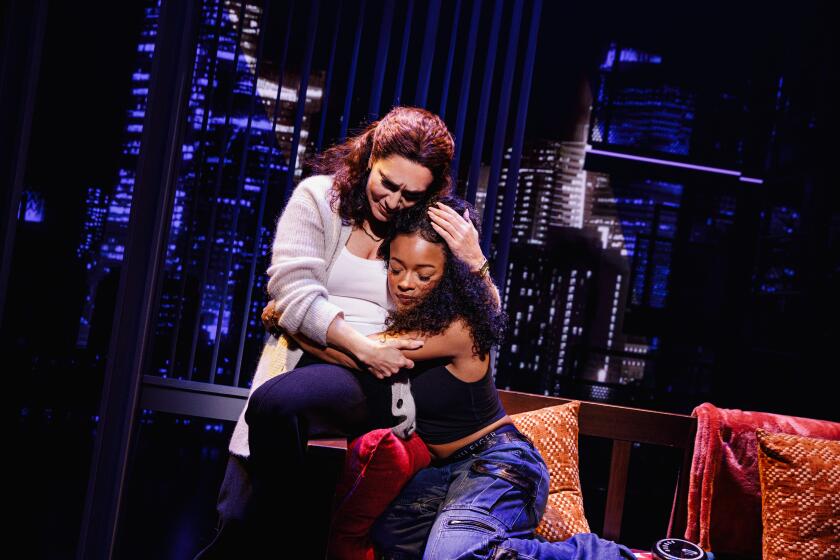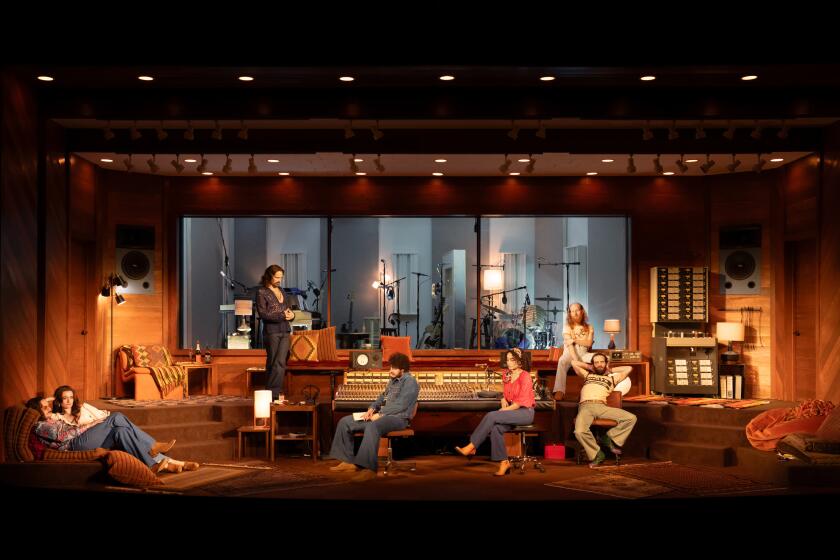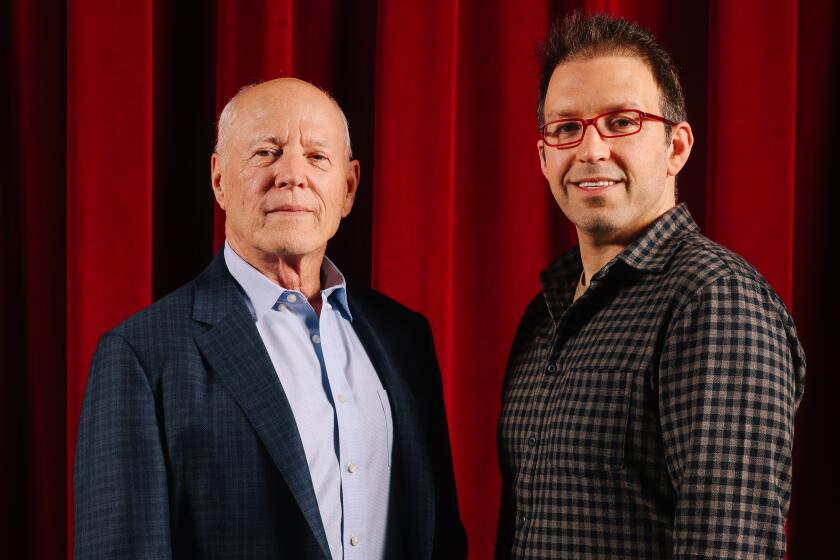Elma Terry ‘really went out on a limb by bringing his play here.’
While the last lines of the play echoed through the half-filled Downey church, the audience sat quietly in the pews as the tragic saga of a Salvadoran peasant named Jesus came to an end.
The scene: a church in El Salvador during the funeral of Archbishop Oscar Romero, who was assassinated in 1980.
The action: Jesus arrives at the funeral carrying palms when suddenly, government troops burst into the church and unleash a round of gunfire, killing him and several other mourners.
The audience sat motionless. The lights went up and faint applause drowned out whispers from the last pew in the church.
“Shhh. I don’t know where the keys are. I gave them to you to put in your purse,” an elderly man whispered to his wife.
The couple fumbled in the woman’s purse for a moment and then followed the nearly 150 audience members as they filed quickly and silently out of Downey First Presbyterian Church.
The play’s two actors stood on the stage, barely done taking their bows, and stared at the people scurrying down the aisles.
For some, the audience’s reaction was understandable. After all, they had just spent 90 minutes watching a man toil over a small piece of barren land to feed his starving family. They watched as rich landowners took that land away. They watched this man, a campesino, mourn the death of his son from malnutrition, the death of his wife, and the disappearance of his daughter, who was killed by government troops who suspected him of being a communist. They also watched as these events weaved themselves into a plot criticizing American involvement in Central America.
Elma Terry, a longtime congregation member, knew there might be risks involved when she decided to bring the play to a conservative, predominantly Republican town like Downey, but she says she wanted to open some eyes.
“I felt that everyone should be aware of what was going on down there,” Terry explained after the play as she gazed at the empty pews. “I suspected it would be difficult for some to sit through, but I’m not sorry I did it.”
Terry said she and her husband, Condon, saw the two-man play, called “A Peasant of El Salvador” last year at a Presbyterian church in Anaheim. She was so moved by the performance that she contacted the Vermont-based performers, who took their show on the road in 1981, and asked them to perform at her church.
With the help of Witness for Peace, a nonprofit, ecumenical group that helped finance the performers’ four-day Southern California tour, Terry convinced the church council to allow the performance.
About 200 tickets were sold, according to Terry, but a little more than half attended the performance. One of Terry’s neighbors, a Salvadoran, said she bought 25 tickets for friends who came to a dinner before the performance but did not show up for the play.
“Downey people are very, very conservative and this was probably hard for them to accept,” said Hope Khattab, who moved to the United States from El Salvador 14 years ago. Terry, a silver-haired woman, seemed to take it in stride as she mingled with a few church members after the play.
But her husband was more skeptical.
“There are over 1,000 congregation members in this church, do you see 1,000 people here tonight?” he asked. “Most of those people are here because of Elma and because she is highly respected here. The rest of these people didn’t show up because, like most people, they didn’t want to expose themselves to something that isn’t in their comfort zone,” Condon Terry said.
After the play, the two actors, George Sanchez and David Perrigo, changed into jeans and T-shirts and sat quietly on the floor of the stage, reflecting on the evening’s performance.
“I was waiting for them to get up and leave,” muttered Sanchez, who played Jesus. “They didn’t get any of the jokes; no one laughed.”
Perrigo, the narrator, just stared at the floor and nodded.
“We have performed this play all over the country and this is the first time I couldn’t figure out where the audience was coming from,” Perrigo said.
“We heard Downey was a conservative town, but conservative means different things to different people. The Midwest reception was overwhelmingly positive, especially in areas that were embroiled in farm foreclosures. The farmers were able to identify with Jesus because, sadly, they had some similar experiences of their own.”
Perrigo and Sanchez said they were surprised that the audience missed some of the humor in the play. In one scene lampooning a White House press conference, Perrigo, who wore a navy blue suit, stood at a podium and gave an abstract slide presentation containing “documentation of communist forces in El Salvador.” Actually, the slide show consisted of Jesus in different poses as he worked his land.
“This is a photograph of a communist guerrilla,” the spokesman said, pointing to Jesus. After the slide show the lights went up and the spokesman said there was time for one question from the press.
“The source of the documentation?” he was asked, then the sound system failed. “Sorry, we have run out of time,” the spokesman said.
Eventually, the spokesman’s voice was drowned out by the sound of a helicopter whirling overhead.
“That scene always gets a laugh,” Perrigo said. “Seventy-five percent of the time we get a round of applause after that scene.”
For a few more minutes, Perrigo and Sanchez lamented over the audience’s response and then packed up the props and the sound system and prepared for three more performances in Orange County before returning to Vermont.
Their mood was sullen, but Perrigo said he was trying to remain optimistic.
“Elma is one courageous lady,” he said. “She really went out on a limb by bringing this play here. As long as there are people like her to shake others up, there’s hope.”
More to Read
Start your day right
Sign up for Essential California for news, features and recommendations from the L.A. Times and beyond in your inbox six days a week.
You may occasionally receive promotional content from the Los Angeles Times.






